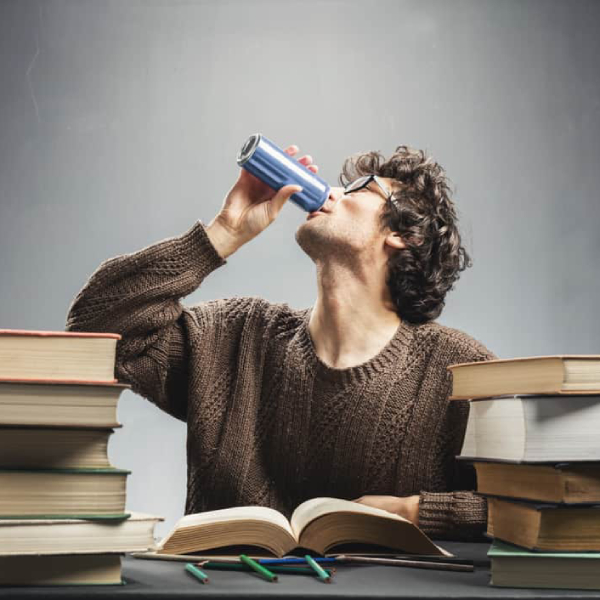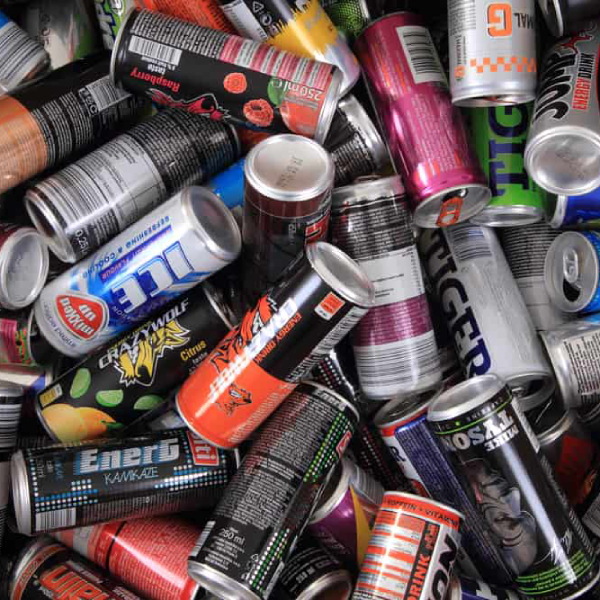Understanding Energy Drink Addiction
Understanding energy drink addiction is crucial for addressing it effectively. This addiction can sneak up on individuals, gradually binding them to a cycle of dependence that can be hard to break.

The Role of Brain Chemistry in Addiction
The brain plays a significant role in addiction. Energy drinks contain high levels of caffeine and sugar. These ingredients trigger the release of dopamine, the ‘feel-good’ hormone. Initially, dopamine release leads to pleasure and alertness. However, over time, as consumption increases, the brain requires more to achieve the same dopamine response. This creates a chemical dependency. Street King Energy Drinks may intensify dopamine release, but increased consumption can foster dependency and diminish their initial pleasurable effects over time.
To understand how to stop drinking energy drinks, it’s essential to grasp this brain chemistry dynamic. Recognizing the signs of chemical dependency can help individuals take early action to prevent full-blown addiction.
Psychological Dependence
Apart from the chemical aspect, there’s also psychological dependence. Some individuals believe they cannot function properly without their daily dose of energy drinks. This belief creates a mental block, reinforcing the habit.
Breaking psychological dependence involves changing one’s mindset. It’s about re-learning how to go about daily routines without relying on an artificial energy boost. Addressing psychological dependence is equally as important as dealing with the chemical side of addiction.
By understanding the dual aspects of energy drink addiction—brain chemistry and psychological dependence—we can tailor strategies to help those seeking to reduce their consumption. In the next sections, we’ll explore how nutrition, sleep, exercise, healthier beverage choices, and environmental changes can play roles in breaking free from the hold of energy drinks. Exploring alternatives like the best 7 brew energy drinks can support healthier choices in nutrition and help reduce psychological dependence on traditional energy drinks.
Nutrition and Energy Drink Cravings
The Importance of a Well-Balanced Diet
A well-balanced diet plays a key role in ending energy drink dependency. It fills nutritional gaps that energy drinks cannot. For example, a diet rich in protein, vegetables, and healthy fats provides lasting energy. This energy comes without the crash that sugar-laden energy drinks cause. Thus, eating balanced meals helps reduce cravings for a quick caffeine hit. Focus on foods like lean meats, whole grains, nuts, and fresh produce. They give the body a steady supply of fuel.
Replacing Junk Food with Healthy Alternatives
Swapping out junk food is also vital for curbing energy drink cravings. Junk food, much like energy drinks, offers a quick but unsustainable energy boost. Replace sweets and processed snacks with healthier options. Try fruits, yogurt, or nuts for snacks. These foods help maintain energy levels throughout the day. The fiber and nutrients they contain support overall health and well-being. Making these swaps can lead to a reduced need for energy drinks to get through the day. When energy drinks came out, they offered quick energy, but swapping junk food for healthier snacks can help maintain energy sustainably.
The Sleep and Energy Drink Cycle
Lack of sleep often leads to grabbing an energy drink for a quick fix. This section explores how sleep deprivation is intertwined with energy drink addiction and offers practical tips for developing better sleep habits to combat the cycle.
How Lack of Sleep Fuels Addiction
Inadequate sleep leaves you tired, reaching for energy drinks for instant energy. Yet, this is a trap. Energy drinks disrupt sleep further due to their caffeine content, creating a vicious cycle. Less sleep results in more energy drinks consumed, and the pattern continues, escalating the addiction. Recognizing this cycle is the first step in learning how to stop drinking energy drinks.

Tips for Better Sleep Habits
Fostering good sleep is vital for breaking the cycle. Here are simple tips to enhance sleep:
- Set a sleep schedule: Go to bed and wake up at the same time every day.
- Create a bedtime routine: Engage in relaxing activities before bed to wind down.
- Limit screen time: Reduce exposure to screens and bright lights at night.
- Make your bedroom sleep-friendly: Ensure it’s dark, cool, and quiet.
- Be wary of naps: If you must nap, keep it short and early in the afternoon.
By following these tips, you can improve your sleep quality, reduce reliance on energy drinks, and take a step toward better health.
The Role of Exercise in Overcoming Addiction
Incorporating exercise into one’s routine can be pivotal in overcoming energy drink addiction. Regular physical activity can help reduce cravings and build healthier habits. Below, we discuss how exercise increases energy naturally and the types of exercises most beneficial for recovery and improved energy levels.
How Exercise Boosts Energy Naturally
When you exercise, your body undergoes remarkable changes. First, your heart rate increases, pumping more oxygen to your muscles. Also, your body releases endorphins, natural mood lifters. This process can mimic the energy surge from energy drinks, but without the crash. Moreover, regular workouts improve sleep quality, providing more energy during the day. Long-term, exercise can reset your body’s energy thresholds, decreasing your need for artificial stimulants.
Exercise strengthens muscles and improves stamina, lessening fatigue. With a fitter body, the perceived need for energy drinks lessens. As your energy levels stabilize, the urge to reach for a quick-fix fades. Lastly, exercise also helps in weight management which, when controlled, makes you feel lighter and more energetic. All these changes together naturally encourage the body to sustain energy without relying on energy drinks.
Best Exercises for Recovery and Energy Levels
Not all exercises are created equal when it comes to recovering from addiction and boosting energy levels. Here are exercises recommended for those looking to improve energy and aid their journey to recovery:
- Cardiovascular exercises, such as brisk walking, running, cycling, or swimming, boost heart health and improve circulation.
- Strength training builds muscle mass and increases metabolism, both key for sustained energy.
- Yoga and Pilates promote mental focus and reduce stress, which can trigger cravings.
- Low-impact activities, like walking or stretching, can be a starting point for beginners or those looking for a gentle routine.
Choosing activities that you enjoy is crucial. Enjoyment leads to consistency, and consistency leads to long-term recovery and better energy management. It is also important to note that too much of even a good thing can be harmful. Over-exercising can lead to exhaustion and may trigger a relapse into seeking quick energy fixes. Moderation and balance are key.
Exercising can be a robust strategy in the fight against energy drink addiction. By understanding how to harness your body’s natural energy through exercise, you can decrease reliance on energy drinks. In the next sections, we will delve into healthier beverage alternatives and environmental changes that can further help one’s journey towards recovery.
Healthier Beverage Alternatives
Switching to healthier beverage alternatives is a powerful step in conquering energy drink addiction.
From High Caffeine to Healthier Choices
Substituting energy drinks with drinks that have lower caffeine or no caffeine is wise. Instead, opt for herbal teas, which can calm and hydrate without the risks of caffeine. Green teas offer a gentle boost while providing antioxidants. If you crave fizz, try sparkling water flavored with natural fruit essence. For coffee lovers, switch to decaf to avoid caffeine jitters.

Also, consider drinks like kombucha for probiotic health benefits. Smoothies made with whole fruits can satisfy a sweet tooth and nourish the body. Such swaps play a crucial role in breaking energy drink habits.
Hydration and Its Impact on Energy
Adequate hydration is crucial for energy and overall well-being. Often, thirst disguises as fatigue, leading to unnecessary energy drink consumption. Drinking plenty of water throughout the day can prevent this mistake. It keeps energy levels stable and supports body functions. Carry a water bottle to remind yourself to sip regularly. This simple habit can greatly reduce the urge to reach for an energy drink.
By embracing healthier drinks and proper hydration, you take meaningful strides towards ending energy drink reliance.
Changing Your Environment to Reduce Cravings
Creating a healthy environment is key in learning how to stop drinking energy drinks. You can make your space conducive to change by removing temptations and fostering support.
Removing Temptations
Clearing your immediate surroundings of energy drinks is a practical step. Scan your home and workspace. Get rid of any energy drinks you find. Without these items in sight, the urge to consume them decreases. Also, avoid places that may trigger your cravings. This includes certain aisles in grocery stores or vending machines with energy drinks. Replace the empty space with healthy alternatives. Stock up on water bottles, herbal teas, and natural juices. Make these the first things you see when you need a drink.
Creating a Supportive Network
Support is vital for overcoming addiction. Share your goal with friends and family. Ask them to encourage your journey to quit energy drinks. They can help keep you on track. Create a group chat or a support group in your community. Here, people can share their successes and struggles. Connect with others who understand what you’re going through. This can bolster your motivation and provide much-needed encouragement. Remember, the journey is easier with allies by your side.
By altering your environment and leaning on a supportive network, you build a foundation for lasting change. In the following sections, we will explore stress management strategies. These can further aid in managing cravings for energy drinks.
Strategies for Stress Management
Managing stress is important when learning how to stop drinking energy drinks.
Techniques to Lower Stress Levels
There are several ways to reduce stress:
- Exercise regularly: Physical activity helps release tension.
- Get enough sleep: A well-rested body copes better with stress.
- Talk about your feelings: Sharing can lighten your mental load.
- Take breaks: Short pauses during the day can refresh you.
- Listen to music: Soothing tunes can calm your nerves.
- Practice deep breathing: It signals your body to relax.
These methods can make you feel more at ease. They can also cut down on the urge for energy drinks.
Mindfulness and its Role in Addictive Behaviors
Mindfulness helps focus on the present moment. It makes you aware of your choices, including reaching for an energy drink. Practice mindfulness with these steps:
- Pay attention: Notice what you are doing and feeling.
- Live in the moment: Focus on the ‘now’ and enjoy it.
- Accept yourself: Be kind to yourself during tough times.
Mindfulness can help you understand why you crave energy drinks. It is a key step in quitting the habit for good.
Conclusion
Wrapping up, breaking free from energy drink addiction requires a multifaceted approach.
Steps Towards a Healthier Lifestyle and Ending Energy Drink Reliance
To conquer energy drink reliance, adopt these steps:
- Embrace a nutritious diet full of proteins, fruits, and healthy fats.
- Prioritize sleep to avoid fatigue-driven energy drink cravings.
- Exercise regularly to boost natural energy and mood.
- Choose healthier drinks like herbal teas or water over energy drinks.
- Modify your environment, eliminating easy access to energy drinks.
- Seek support from friends and family on your journey to quit.
- Manage stress through techniques like deep breathing and mindfulness.
By following these strategies and understanding the underlying addiction mechanisms, you can reduce energy drink consumption and promote a healthier lifestyle. Start slow, stay consistent, and remember to celebrate every small victory. The pathway to recovery is challenging, but with commitment, it’s achievable.